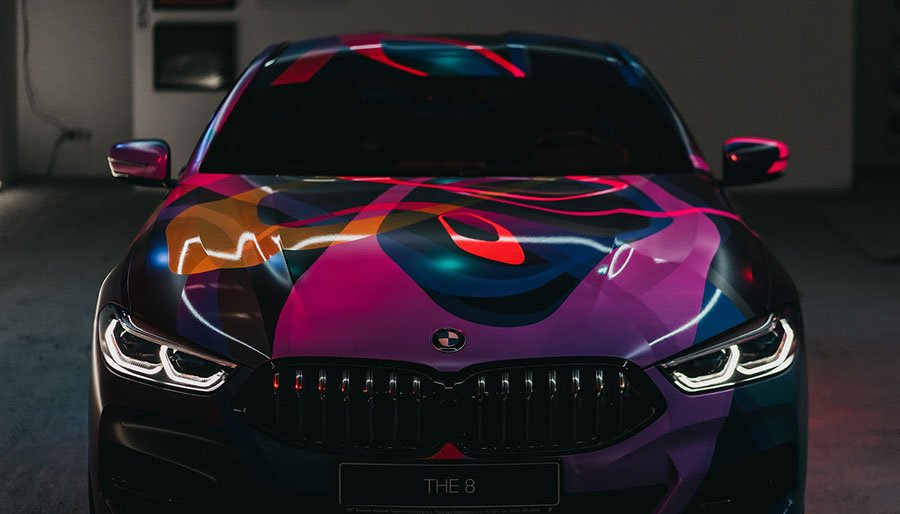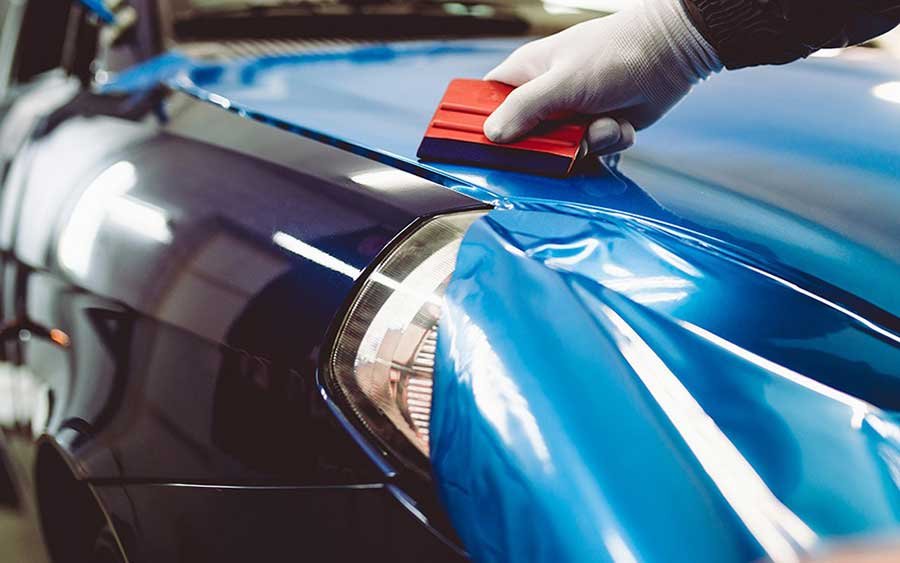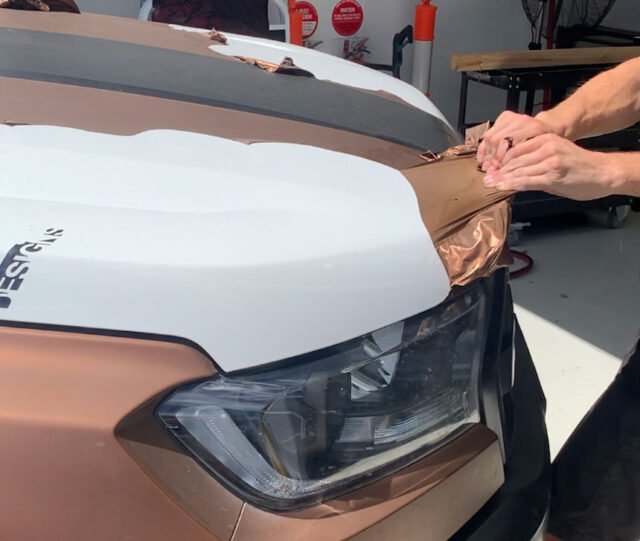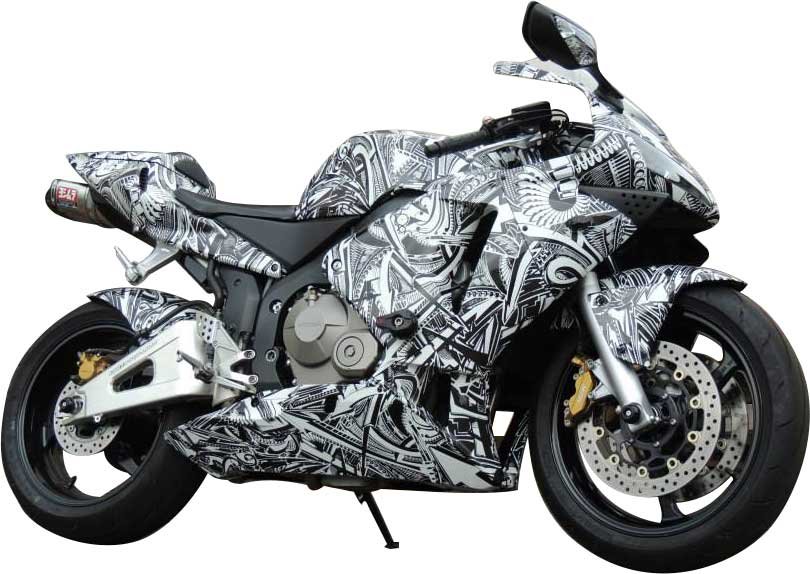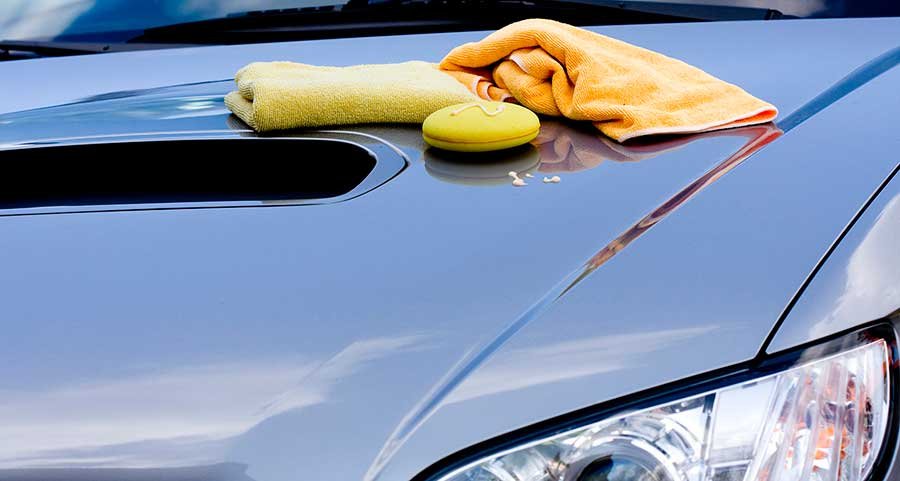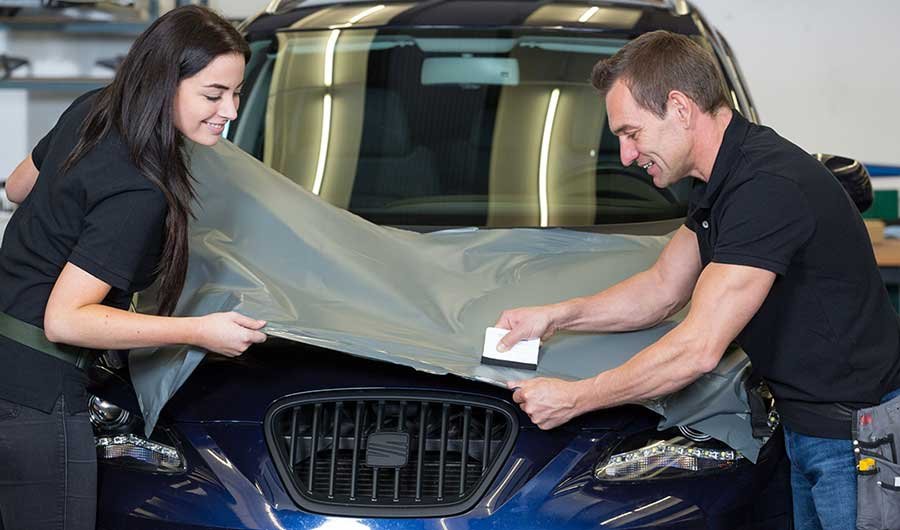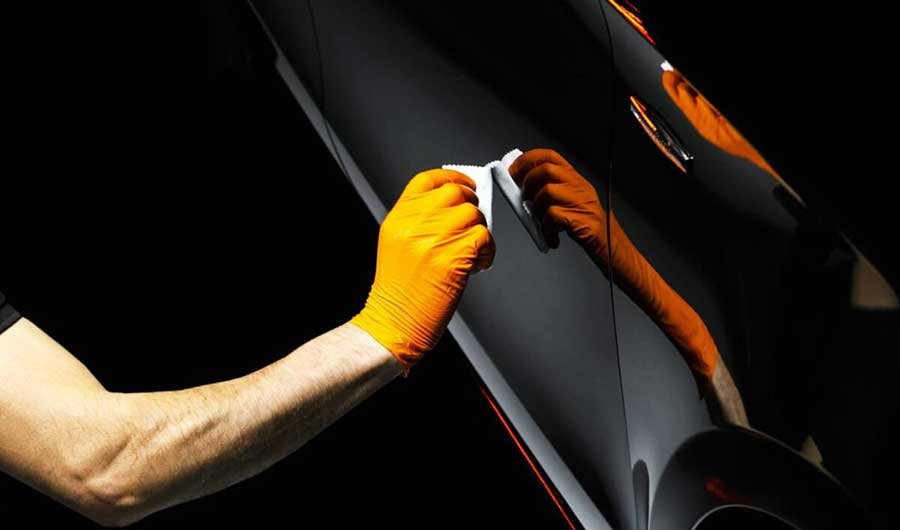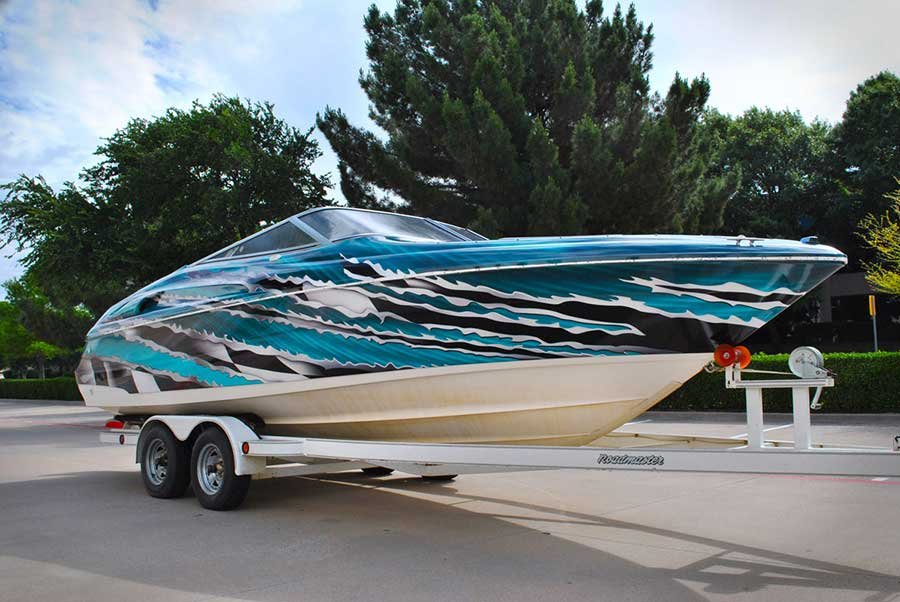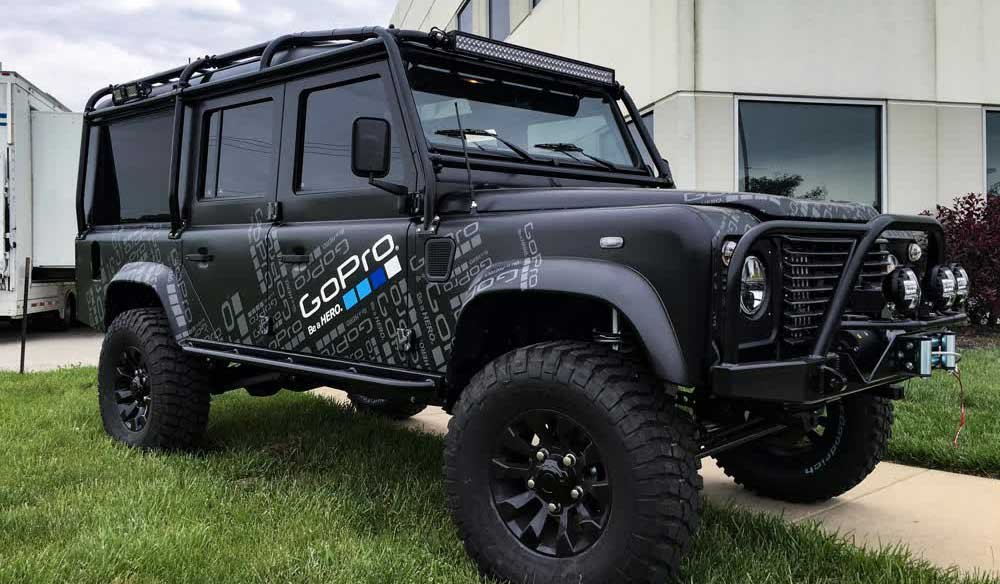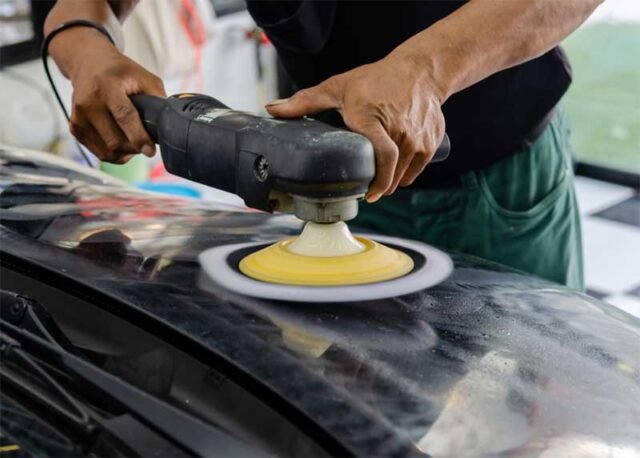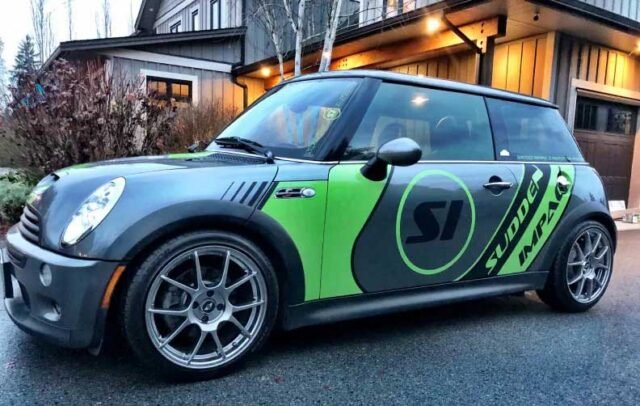A vinyl wrap is a thin, adhesive-backed material used to change the appearance of various surfaces, most commonly vehicles. It’s a cost-effective and customizable alternative to traditional painting. The wrap adheres to the surface and can feature a variety of colors, textures, patterns, or graphics. It is commonly used for cars, but they can also be applied to boats, motorcycles, furniture, and more, allowing for easy customization and protection.
• What are the benefits of vinyl wraps?
It offer numerous advantages. They allow you to change the color and design of your vehicle or other surfaces without the permanence of paint. They can protect the underlying surface from minor abrasions and UV damage. Wraps are customizable, so you can achieve a unique look. Removal is generally straightforward, and they can be more cost-effective than traditional painting.
• How long does a vinyl wrap last?
The lifespan of a vinyl wrap depends on various factors, including the quality of the material, installation, and environmental conditions. Typically, a professionally installed vinyl wrap on a vehicle can last from three to seven years or even longer with proper care. Frequent exposure to harsh sunlight, extreme weather, and poor maintenance can shorten its lifespan. However, these wraps are designed to be relatively durable and provide lasting protection and aesthetics.
• Can I change the color of my car with a vinyl wrap?
Yes, you can change the color of your car with a vinyl wrap. Vinyl wraps come in an extensive range of colors and finishes, from matte to gloss and even specialty textures. This allows you to transform the appearance of your vehicle without the need for a full paint job. It’s a versatile and cost-effective way to achieve a new look and protect your car’s original paint simultaneously.
Read More
• What services do we provide in the field of vinyl wraps?
• Is vinyl wrap removal easy?
It removal is typically a straightforward process when done by a professional. The adhesive used in it is designed to be removable without damaging the underlying surface. However, it’s essential to have the wrap removed by an experienced installer to ensure a clean and residue-free result. DIY removal can be challenging and may lead to damage if not done correctly. A professional can also assess the condition of the underlying paint after removal.
• Can I wrap only specific parts of my vehicle?
Yes, you can choose to wrap specific parts of your vehicle, such as the hood, roof, mirrors, or accents. Partial it offer customization options and can enhance the vehicle’s aesthetics without covering the entire surface. This allows you to achieve a unique and eye-catching look while potentially reducing the cost compared to a full wrap.
• What types of vehicles can be wrapped with vinyl?
It can be applied to a wide range of vehicles, including cars, trucks, motorcycles, boats, RVs, buses, and even planes. They are versatile and can be used for personal, commercial, and promotional purposes. The ability to customize the appearance of nearly any vehicle makes vinyl wraps a popular choice among vehicle owners and businesses looking to make a statement.
• What is the cost of a vinyl wrap?
The cost of a vinyl wrap can vary significantly based on several factors. These include the size of the vehicle, the complexity of the installation, the type of vinyl material used, and any additional design elements or graphics. As a general guideline, a full vinyl wrap for a standard-sized car can range from a few hundred to a few thousand dollars. It’s advisable to get quotes from professional installers to determine the specific cost for your project.
• Are vinyl wraps only for cars?
No, it is not limited to cars. While they are commonly used for automotive customization, they can also be applied to a wide range of surfaces, including boats, motorcycles, bicycles, trucks, walls, furniture, appliances, and more. The versatility of vinyl wraps makes them a popular choice for both personal and commercial applications where customization and protection are desired.
• Are vinyl wraps suitable for commercial advertising?
Yes, it is an excellent choice for commercial advertising. They provide a versatile and eye-catching way to promote businesses on vehicles, storefronts, and other surfaces. Vehicle wraps, in particular, are effective mobile advertisements that can reach a broad audience. Custom graphics and branding on vinyl wraps can create a professional and memorable impression for businesses of all sizes.
• How does a vinyl wrap compare to a traditional paint job?
It offer several advantages compared to traditional paint jobs. They are more cost-effective, customizable, and can be applied in less time. Wraps provide an extra layer of protection to the vehicle’s original paint, reducing minor abrasions and UV damage. Additionally, they are removable, allowing for changes in design or color without the need for a complete repaint.
• What is the difference between a vinyl wrap and a paint protection film (PPF)?
While both vinyl wraps and paint protection films (PPF) are adhesive-backed materials, they serve different purposes. It is primarily used for customization and aesthetics, allowing you to change the color and appearance of a vehicle. PPF, on the other hand, is designed to protect the vehicle’s paint from minor abrasions, stone chips, and road debris while maintaining the original paint color and finish.
• Can I customize the design of a vinyl wrap?
Yes, you can fully customize the design of a vinyl wrap. Graphic designers and installers can create unique designs, including logos, images, patterns, and branding elements. With the use of high-quality printing technology, virtually any design can be replicated on the vinyl material, providing limitless possibilities for customization.
• Are vinyl wraps resistant to UV rays?
It is designed to be UV-resistant. They can protect the underlying surface from the harmful effects of ultraviolet (UV) rays. This UV resistance is particularly valuable for vehicles and surfaces exposed to sunlight. It helps prevent color fading and degradation, ensuring that the vinyl wrap and the underlying paint remain vibrant and in good condition.
• Do vinyl wraps provide any protection to the underlying paint?
Yes, it offer a degree of protection to the underlying paint. They act as a barrier against minor abrasions, road debris, and UV damage. This protection can help preserve the vehicle’s original paint, maintaining its appearance and reducing the risk of damage from external factors. While vinyl wraps are not a substitute for paint protection films (PPF), they offer valuable added defense.
• Can I wash my vehicle as usual with a vinyl wrap?
You can wash a vehicle with a vinyl wrap as you would with traditional paint, but it’s essential to use a gentle hand and avoid harsh chemicals or abrasive brushes. Hand washing with a mild detergent and a soft cloth or sponge is the safest approach. High-pressure car washes with rotating brushes should be avoided, as they can potentially damage the edges of the wrap. Regular and gentle cleaning will help maintain the wrap’s appearance and longevity.
• Are vinyl wraps prone to peeling or bubbling?
When professionally installed, it is less likely to peel or bubble. Peeling or bubbling can occur if the installation is not done correctly, if the surface was not properly prepared, or if low-quality materials were used. Professional installers ensure a smooth application, tightly adhering the vinyl to the surface, which reduces the risk of these issues. DIY installations are more prone to peeling and bubbling if not executed with precision.
• Do vinyl wraps damage the original paint?
High-quality vinyl wraps are designed to be non-damaging to the original paint when properly applied and removed. However, if the underlying paint is already in poor condition, with flaking or peeling paint, there is a slight risk that the removal process could cause further damage. This is why professional installation and removal are recommended, as experts can assess and minimize potential risks to the original paint.
• Can I wrap a leased vehicle?
Yes, you can wrap a leased vehicle with a vinyl wrap, but it’s essential to review your lease agreement to ensure there are no restrictions or clauses that prohibit modifications to the vehicle’s appearance. Many leases allow for temporary modifications like vinyl wraps as long as the vehicle is returned in its original condition. It’s advisable to consult with your leasing company and have the wrap professionally installed and removed to avoid any potential lease violations.
• What are the maintenance requirements for vinyl wraps?
It require minimal maintenance to ensure their longevity and appearance. Regular washing with mild soap and water is usually sufficient to keep the wrap clean. Avoid harsh chemicals or abrasive cleaning tools. For added protection, using a vinyl wrap-specific spray wax or sealant can maintain the finish and extend the lifespan of the wrap.
• Can I install a vinyl wrap myself?
While some experienced individuals may attempt a DIY vinyl wrap installation, it is a complex process that often requires professional expertise. Professional installers have the skills, tools, and controlled environments necessary to achieve a flawless application, minimize the risk of defects, and ensure a long-lasting result. DIY installations may lead to issues like wrinkles, bubbles, and misalignment, impacting the final appearance.
• How long does it take to install a vinyl wrap?
The time required to install a vinyl wrap depends on the size and complexity of the vehicle or surface, as well as the experience of the installer. A full vehicle wrap can take anywhere from a few hours to a few days. Smaller projects, like wrapping specific vehicle parts, may be completed in a shorter timeframe. Professional installers can provide estimated installation times based on the specific project.
• Are vinyl wraps available in different finishes, like matte or gloss?
Yes, it come in various finishes, including matte, gloss, satin, and specialty textures. This diversity allows for customization and helps you achieve the desired look for your vehicle or surface. Matte finishes offer a non-reflective, modern appearance, while gloss finishes provide a classic and shiny look. The choice of finish depends on personal preference and the intended style.
• Can I wrap textured or irregular surfaces?
It can be applied to textured or irregular surfaces, but the installation process may be more challenging. The flexibility and conformability of the vinyl material allow it to adhere to a variety of surfaces. However, thorough surface preparation, including cleaning and, in some cases, priming, may be required to ensure a proper bond. It’s advisable to consult with a professional installer to determine the feasibility of wrapping textured surfaces.
• What is the life expectancy of a vinyl wrap in extreme weather conditions?
The lifespan of a vinyl wrap in extreme weather conditions, such as intense heat or severe cold, can be affected. High temperatures may accelerate wear and fading, while extreme cold can make the material more rigid. However, high-quality it is designed to withstand a wide range of weather conditions. Regular maintenance and using a vinyl-specific sealant can help extend the life of the wrap in extreme climates.
• Can I remove a vinyl wrap without leaving residue?
Yes, it is designed to be removable without leaving adhesive residue when done correctly. Professional installers use techniques and tools to ensure clean removal. However, if the wrap has been on for an extended period, and especially if it was not properly maintained, there might be a slight adhesive residue. This residue can typically be removed with adhesive removers or isopropyl alcohol without damaging the underlying surface.
• Are vinyl wraps available in custom patterns or textures?
Yes, it can be customized with patterns, textures, and graphics to achieve unique and personalized designs. Graphic designers and professional installers can work together to create custom artwork, branding, or textures that suit your preferences and project requirements. This customization is particularly popular for commercial advertising, personal expression, and unique vehicle aesthetics.
• Can I choose a specific brand of vinyl wrap material?
Yes, you can often choose the brand and type of vinyl wrap material used for your project. There are various reputable manufacturers of vinyl wrap materials, each offering a range of products with different characteristics, such as durability, finish, and price. Popular brands like 3M, Avery Dennison, and Oracal are commonly used by professional installers. When working with a professional installer, you can discuss your preferences and requirements, and they can recommend the most suitable material for your specific project.
• Are there limitations on the colors I can choose for my vinyl wrap?
The color options for it is extensive and not significantly limited. You can choose from a wide range of colors, including standard, metallic, and specialty finishes. Custom color matching is also possible if you have a specific shade or hue in mind. The variety of colors available ensures that you can achieve the look you desire, whether it’s a classic finish, a vibrant shade, or something unique and eye-catching.
Click to see other gtautomtl services
• Can I have graphics or images printed on my vinyl wrap?
Yes, you can have graphics, images, and custom designs printed on your vinyl wrap. High-quality printing technology allows for precise reproduction of graphics, logos, and images on the vinyl material. This capability is especially useful for businesses looking to brand their vehicles, as well as individuals who want to express their unique style or incorporate intricate designs into the wrap.
• What is the difference between a full wrap and a partial wrap?
A full wrap covers the entire surface of the vehicle or object, providing a complete transformation of its appearance. In contrast, a partial wrap covers only specific areas or parts of the surface. Partial wraps are often used to create accents, add branding elements, or enhance the aesthetics of particular sections, such as hoods, roofs, or side panels. The choice between a full or partial wrap depends on personal preference and project goals.
• Are vinyl wraps reversible?
It is semi-permanent, meaning they can be removed without damage to the underlying surface. This reversibility is one of the advantages of vinyl wraps. However, once removed, the wrap cannot be reapplied. Keep in mind that the condition of the original paint under the wrap may have changed over time. To maintain the best appearance and condition, it’s essential to have the wrap professionally installed and removed.
• Can vinyl wraps be waxed or polished?
Yes, you can wax or polish a vinyl wrap to enhance its appearance and protect it. Using a vinyl wrap-specific spray wax or sealant can help maintain the finish and prolong the life of the wrap. It’s advisable to avoid abrasive or heavy compounds and tools, as they can damage the wrap. Gentle hand waxing and polishing are recommended for the best results.
• Do vinyl wraps come with a warranty?
Many vinyl wrap manufacturers offer warranties for their products, but the specific terms and duration can vary. It’s important to discuss warranty details with your installer and choose a reputable brand of vinyl wrap material. The warranty typically covers issues like color fading, cracking, or peeling. Keep in mind that professional installation is often a requirement to qualify for these warranties.
• Are there any restrictions on where I can apply a vinyl wrap?
It can be applied to various surfaces, but it’s essential to consider the material and condition of the surface. Common applications include vehicles, walls, windows, and flat or slightly curved objects. However, textured or highly irregular surfaces may present challenges for installation. Consulting with a professional installer can help determine whether a specific surface is suitable for a vinyl wrap.
• Can vinyl wraps be applied to windows or glass surfaces?
It can be applied to windows or glass surfaces, but it’s important to use perforated window film or window graphics that allow for visibility from the inside. This is commonly done for promotional and advertising purposes on vehicles. For full window tinting or privacy film, other specialized products are typically used instead of standard vinyl wraps.
• What types of adhesives are used in vinyl wraps?
It use pressure-sensitive adhesives (PSAs), which are designed to bond when pressure is applied during installation. These adhesives create a strong and durable bond between the vinyl material and the surface while remaining removable without residue when professionally installed and removed. There are variations in adhesive strength based on the specific vinyl wrap material, ensuring compatibility with different surfaces.
• Can vinyl wraps be used for interior vehicle customization?
It can be used for interior vehicle customization, allowing you to change the look of the interior panels, dashboards, trim, and other components. This customization option provides a cost-effective way to achieve a unique and personalized interior aesthetic without the need for expensive modifications or replacements.
• Do vinyl wraps require any special care in extreme temperatures?
It is designed to withstand a wide range of temperatures, but some care may be needed in extreme conditions. In high heat, it’s advisable to provide shade or use a reflective sunshade to prevent excessive heat exposure. In cold conditions, gently heating the wrap during installation can improve adhesion. Regular maintenance and using a vinyl-specific sealant can also help extend the life of the wrap in extreme temperatures.
• Can I wrap my motorcycle or bike with vinyl?
Yes, you can wrap your motorcycle or bicycle with vinyl to achieve a customized appearance. Vinyl wraps are versatile and can adhere to various vehicle surfaces, including the body, fairings, gas tanks, and fenders. This provides a cost-effective way to personalize your ride, protect the original paint, and easily revert to the original finish if desired.
• Do vinyl wraps hide existing imperfections in the paint?
It can conceal minor imperfections in the underlying paint, such as small scratches or blemishes. However, significant or deep paint imperfections will still be visible through the wrap. It’s important to have the surface properly prepared before installation to ensure the best appearance. Wraps can also prevent further damage to the paint, helping maintain its overall condition.
• Are vinyl wraps safe to use on vintage or classic cars?
It is safe for use on vintage or classic cars and can offer several benefits. They provide protection against environmental damage, UV rays, and contaminants that can affect the appearance and value of these cherished vehicles. Additionally, vinyl wraps enhance the gloss and depth of the paint, making classic cars look their best. To preserve the value of vintage cars, it’s advisable to have a professional installer with experience in working with these vehicles apply the vinyl wrap.
• Can vinyl wraps be applied to boats and other watercraft?
Yes, It can be applied to boats and other watercraft, providing a customizable and protective solution. Wraps are particularly useful for changing the appearance of boats, adding branding, or creating unique graphics. They can also protect the boat’s hull and surfaces from the effects of water, sun, and salt, extending the lifespan of the underlying finish.
• Can vinyl wraps be used for customizing vehicle interiors?
While vinyl wraps are often associated with exterior customization, they can also be used to customize vehicle interiors. Interior wraps are a versatile way to change the appearance of interior panels, trim, and other components. They can be used to create unique cabin aesthetics, incorporate branding, or refresh the interior without the need for expensive
• Are vinyl wraps suitable for racing stripes and vehicle accents?
It is an excellent choice for creating racing stripes and vehicle accents. They offer precise and consistent results, allowing for clean lines and precise detailing. Racing stripes and accents can enhance the sporty or classic appearance of a vehicle, and vinyl wraps are a cost-effective way to achieve these looks without the need for paint and potential permanent alterations.
• Do vinyl wraps require any special cleaning products?
Vinyl wraps do not require special cleaning products, but it’s essential to use mild, non-abrasive cleaning solutions to maintain their appearance. Regular car wash soaps and a soft cloth or sponge are suitable for cleaning. It’s advisable to avoid harsh chemicals or abrasive brushes that can damage the wrap. Using vinyl wrap-specific cleaning products can also help maintain the finish and extend its lifespan.
• Are there any environmental considerations with vinyl wrap installation?
Vinyl wraps themselves are generally considered environmentally friendly. They do not release harmful emissions or fumes during installation. However, proper disposal of vinyl wrap waste and related materials is essential. Many installers ensure eco-friendly practices by recycling materials and minimizing waste. When considering a vinyl wrap project, it’s a good practice to ask the installer about their environmental policies.
• Can vinyl wraps be used on commercial delivery vehicles?
Yes, It is commonly used on commercial delivery vehicles for branding and advertising purposes. Wrapping delivery vans, trucks, and other vehicles with company logos, contact information, and promotional graphics provides a mobile marketing platform that can reach a wide audience. It’s a cost-effective way to promote your business and create a professional image on the road.
• Are vinyl wraps fire-resistant?
It is not inherently fire-resistant, but some vinyl materials have fire-resistant properties. When used in vehicles, it’s essential to ensure that the vinyl wrap material meets safety standards. For specific applications where fire resistance is a concern, it’s advisable to consult with a professional installer who can recommend suitable vinyl wrap materials to meet safety
• Do vinyl wraps require any special care for off-road vehicles?
Vinyl wraps on off-road vehicles, like ATVs and dirt bikes, can face more significant wear and tear due to rough terrain and exposure to mud, rocks, and branches. These wraps may require more frequent cleaning and maintenance to remove debris and prevent damage. Using vinyl-specific sealants can provide added protection in off-road conditions, helping to extend the life of the wrap.
• Are vinyl wraps safe for use on vintage or classic car exteriors?
Yes, it is safe for use on vintage or classic car exteriors and offer several advantages. They protect the original paint from environmental damage and preserve the car’s value. It can also enhance the car’s aesthetics and make it look its best.
To ensure a seamless application and safe removal, it’s advisable to have a professional installer with experience working on classic cars apply and remove the wrap.
• Do vinyl wraps require any special care in snowy or icy conditions?
Vinyl wraps do not require specific care in snowy or icy conditions, but it’s essential to remove snow and ice gently to avoid damaging the wrap. Avoid using sharp tools or scraping devices that could scratch the vinyl. It’s advisable to use a soft brush or a gentle snow brush to clear the surface. It can withstand cold temperatures without issues, and regular maintenance is key to maintaining their appearance in all weather conditions.
• Are vinyl wraps suitable for off-road vehicles or ATV customization?
It is well-suited for off-road vehicles and ATVs, providing a cost-effective way to customize their appearance. Off-road vehicles often endure rough terrain, so it can help protect the surfaces from scratches and damage. Wraps are flexible and durable, making them ideal for off-road applications and the customization of ATVs.
• Can vinyl wraps be applied to golf carts or recreational vehicles (RVs)?
Yes, it can be applied to golf carts and recreational vehicles (RVs). Wrapping golf carts offers a unique way to customize these vehicles for personal or promotional use. RVs can also benefit from vinyl wraps by achieving a fresh and personalized look without the need for a full repaint. The versatility of vinyl wraps makes them suitable for various recreational vehicles.
• Are vinyl wraps safe for use on industrial and construction vehicles?
It is safe for use on industrial and construction vehicles. They offer a practical way to label, brand, and protect these vehicles. Wraps can feature industrial-grade adhesives that ensure a strong and long-lasting bond on heavy machinery and equipment. This customization option is valuable for asset identification, safety labeling, and promotional purposes on industrial and construction vehicles.
Feel free to use these detailed answers on your website to provide valuable information to your audience interested in vinyl wraps.
• Can vinyl wraps be removed and reused on a different vehicle?
It is typically not designed for reuse on different vehicles. The process of removal can cause wear and stretching of the material, making it difficult to reapply. Wraps are considered a one-time application, and new materials are recommended for each project.
• What is the difference between a vinyl wrap and a vinyl decal?
It is a large adhesive-backed material used to cover entire surfaces, such as a vehicle, for a full transformation. A vinyl decal, on the other hand, is a smaller vinyl graphic or design that is applied to a specific area, often for branding, logos, or decorative purposes. Decals are typically smaller and do not cover the entire surface.
• Are vinyl wraps resistant to chemicals and solvents?
High-quality vinyl wraps are resistant to many common chemicals and solvents, making them suitable for a wide range of applications. However, some aggressive chemicals may damage the wrap over time. It’s advisable to avoid contact with harsh chemicals and promptly clean any spills or splashes to maintain the wrap’s appearance.
• Can vinyl wraps be used on surfaces with compound curves or complex shapes?
It is designed to conform to complex shapes and compound curves, making them suitable for applications on vehicles with intricate designs. Professional installers have the expertise and tools to ensure that the wrap adheres smoothly to surfaces with irregular contours, resulting in a seamless and professional appearance.
• Can vinyl wraps be used to cover up rust or corrosion on a vehicle’s body?
While it can conceal minor imperfections, they are not a suitable solution for covering up rust or corrosion on a vehicle’s body. It’s crucial to address rust issues properly before applying a wrap. Wrapping over rust can result in poor adhesion and further deterioration of the underlying metal.
• Can vinyl wraps be applied to a vehicle’s roof without risk of peeling or damage?
It can be applied to a vehicle’s roof without a significant risk of peeling or damage. When professionally installed, wraps adhere securely to the roof surface. Proper surface preparation and installation techniques are essential to ensure a long-lasting and secure bond.
• What should I do if my vinyl wrap becomes scratched or damaged?
Minor scratches or damage to a vinyl wrap can often be addressed with a vinyl-specific repair kit. These kits typically include materials to fill in scratches or imperfections. For more severe damage, it’s advisable to consult with a professional installer who can assess the extent of the damage and recommend suitable solutions.
Can it be applied to surfaces that have been painted with specialty or custom finishes?
It can generally be applied to surfaces with specialty or custom paint finishes. However, it’s important to ensure that the painted surface is well-prepared and free from defects. Wraps may not adhere well to surfaces with excessive texture or certain types of custom paint that create an uneven base.



